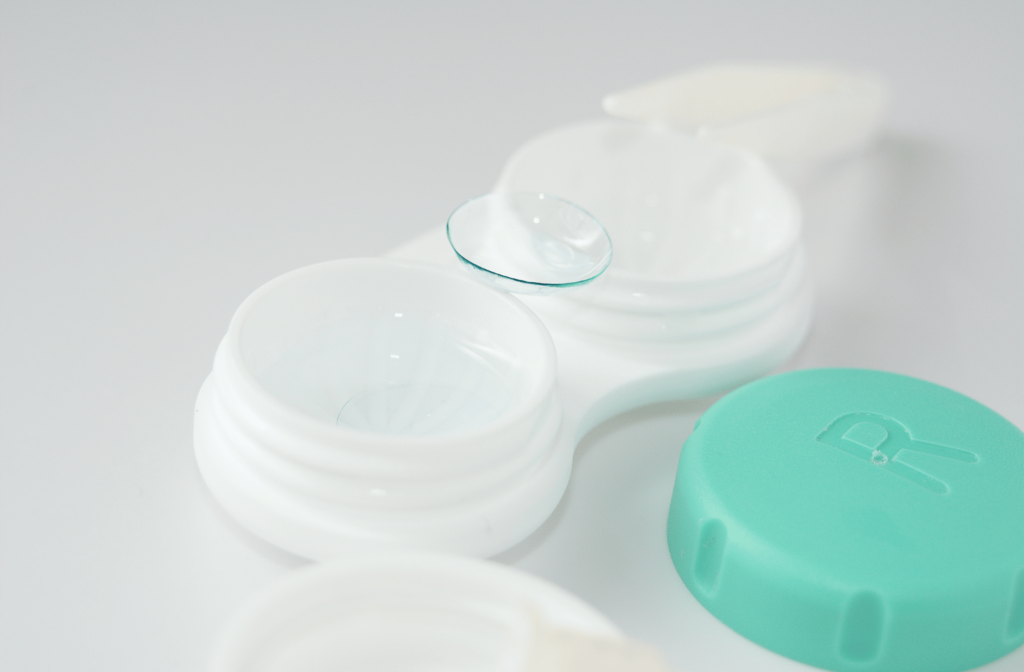Dry eyes can be a tricky problem to deal with. Not only do they cause discomfort, but they also limit your ability to wear specific types of contact lenses. But here’s the good news—it’s not an impossible challenge!
Having dry eyes does not mean you must give up on contact lenses. It just requires a bit more thought and knowledge when selecting which ones to use.
Some of the best contacts for dry eyes include daily, silicone hydrogel, hybrid, and scleral lenses. However, the best one for you depends on your lifestyle and unique needs. Your optometrist is here to guide you through this process. So let’s talk!
What Are Dry Eyes?
Dry eyes typically happen for 1 of 2 reasons: either your eyes don’t make enough tears, or they produce low-quality tears that evaporate too fast. If you’re dealing with low-quality tears, it’s probably due to meibomian gland dysfunction (MGD), which is the most common culprit for dry eyes.
Dry Eye Symptoms
Dry eye symptoms vary between people, but common ones include:
- Persistent dryness
- Blurry vision
- Itchiness
- Burning sensations
- Redness
- Gritty pain in the eyes
- Eye fatigue, even when well-rested
- Excessive tearing
Dry eyes can turn simple tasks like reading, driving, and computer work into Herculean jobs. So, if you’re a contact lens wearer, picking products that won’t cause more pain than they’re worth is absolutely crucial.
Risk Factors for Dry Eyes
Many things can cause dry eyes, and more often than not, it won’t be one single factor. Some factors that can increase your risk of dry eyes, or make them worse, include:
- Age
- Hormonal changes (especially in women)
- Genetics
- Allergies
- After-effects of laser eye surgery
- Smoky, dry, or hot environments
- Immune conditions like rheumatoid arthritis, thyroid disease, Parkinson’s disease
- Certain medications, such as antidepressants, steroids, and antihistamines
And don’t think contact lenses get off scot-free! Some studies show that contacts might be linked to dry eyes.
Can Contacts Make Dry Eyes Worse?
Research suggests that contact lenses with high water content might increase the likelihood of developing dry eyes. You’d think more water would mean more hydration, but the opposite may be true.
Here’s why: the water in these lenses attracts lipids and proteins from the eye, destabilizing the tear film that moisturizes your eyes and potentially leading to lens dehydration. This may not be a problem for many people, but for people already dealing with dry eyes, it can send your symptoms over the edge once the lens dries out.
You may need to experiment with a few different water contents until you find the right balance for your eyes.
Types of Contacts Best for Dry Eyes
Your optometrist can help identify the root cause of your dry eyes with a comprehensive eye exam before jumping into treatment mode. Treatments include lubricating eye drops to bring back that much-need moisture or lifestyle changes to prevent symptoms. And even if contact lenses aren’t the direct cause, you may find it more comfortable to switch to another type.
Fear not! There are plenty of options to explore.
Daily Lenses
Contact lenses have different wear schedules, and daily lenses are designed to be thrown out at the end of every day. Because you start each morning with a fresh, clean pair of lenses, you reduce the chance of protein build-up that can cause discomfort.
Daily contacts are also generally made of a soft, flexible plastic that lets oxygen pass through to the eye. Most people find them more comfortable than rigid gas-permeable (RGP) lenses, so they may be gentle on irritated, dry eyes.
However, soft contact lenses have water content. Watch out for high water content that can cause the lenses to dry out too fast, leaving your eyes exposed to irritation.
Silicone Hydrogel
Silicone hydrogel is an absorbent plastic material that has become popular in soft contact lens manufacturing. This silicone-based lens has a lower water content and doesn’t allow the water to evaporate as fast. By keeping the eyes hydrated longer, these lenses can help reduce irritating dry eye symptoms.
Hybrid Lenses
Soft and RGP lenses have advantages and drawbacks, so why not take the best from both? That’s the theory behind hybrid lenses, which have a rigid gas-permeable centre paired with a soft ring around the outside.
For those with mild dry eyes, this soft ring offers the comfort you need and the RGP centre provinces clear, crisp vision.
Scleral Lenses
Traditional contact lenses sit directly on the cornea, which can be a pain when the eye is dry and irritated. But what if the contact avoided the eye?
Scleral lenses are much bigger than your average lens and sit on the whites of the eyes (sclera), “vaulting” over the cornea. Not only does this design keep them from touching most of the eye, but it also creates a little space between themselves and the cornea. Fluid can be inserted into this space, becoming a mini oasis for dry eyes.
This reservoir provides continuous hydration throughout the day and has been found to significantly reduce dry eye symptoms.
Dry Eye Relief for Contact Wearers
Choosing the right contact lenses is a big decision, especially if you have dry eyes. Silicone hydrogel and scleral lenses often get top marks in the dry eye department. However, your optometrist can help guide you forward.
Our team at Orchard Park Optometry offers contact lenses designed for people with dry eyes. We can also examine your tear film and help you find relief through a variety of effective I-Med Pharma products. Bring comfort to your vision again. Book an eye exam today!




